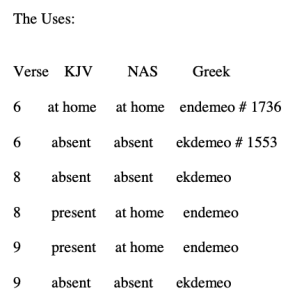At Home and a Stranger
‘For we know that if our earthly house of this tabernacle were dissolved, we have a building of God, an house not made with hands, eternal in the heavens. (2) For in this we groan, earnestly desiring to be clothed upon with our house which is from heaven: (3) If so be that being clothed we shall not be found naked. (4) For we that are in this tabernacle do groan, being burdened: not for that we would be unclothed, but clothed upon, that mortality might be swallowed up of life. (5) Now he that hath wrought us for the selfsame thing is God, who also hath given unto us the earnest of the Spirit. (6) Therefore we are always confident, knowing that, whilst we are at home in the body, we are absent from the Lord: (7) (For we walk by faith, not by sight.) (8) We are confident, I say, and willing rather to be absent from the body, and to be present with the Lord. (9) Wherefore we labor, that, whether present or absent, we may be accepted of him. (10) For we must all appear before the judgment seat of Christ, that every one may receive the things done in his body, according to that he hath done, whether it be good or bad’. (2 Corinthians 5:1-10)
The meaning of this passage is greatly obscured by the presence of poor translation. In the King James Version, two Greek words are translated three ways in English: ‘at home,’ ‘absent,’ and ‘present.’ The NAS uses only two English equivalents: ‘absent’ and ‘at home.’ The only word which closely gives the actual meaning of the Greek is ‘at home’ – meaning comfortable with one’s surroundings.
The two Greek words involved are the same except for their initial syllable. One begins with ek meaning ‘from’ or ‘out of,’ the other begins with en meaning ‘in.’ Each prefix is then followed by demeo – the word from which we get words like demographic, democracy, etc. It means ‘A people.’ Thus, the two words with their basic meanings are:
- Endemeo – to be in one’s country, that is, to be ‘at home.’
- Ekdemeo – to be out of one’s own country, that is, to feel like a stranger.
These definitions come from the meanings of the word as can be gleaned from several sources, including a careful and thoughtful examination of concordances. The NAS Exhaustive Concordance (an update of Strong’s) and Strong’s both use the same numbering system in their dictionaries. Endemeo is #1736; Ekdemeo is #1553. Demeo is #1218. The prefix en is #1722; ek is 1537.
The point is, Paul is not talking about being in or out of the body, but rather about feeling or not feeling comfortable in our present circumstances. The KJV use of ‘present’ is unconscionable. The use of ‘absent’ in both KJV and NAS versions is, at best, a poor choice. {1}

– David Doran
{1} Editor’s Note: This portion of the text could therefore be rendered: ‘Therefore we are always confident, knowing that, whilst we are [at home] in the body, we are [a stranger] from the Lord; (For we walk by faith, not by sight:) We are confident, I say, and willing rather to be [a stranger] from the body, and to be [at home] with the Lord. Wherefore we labor, that, whether [at home] or [a stranger], we may be accepted of him.’
